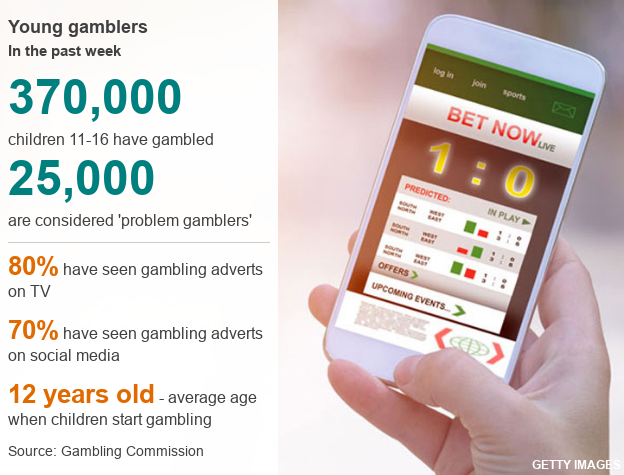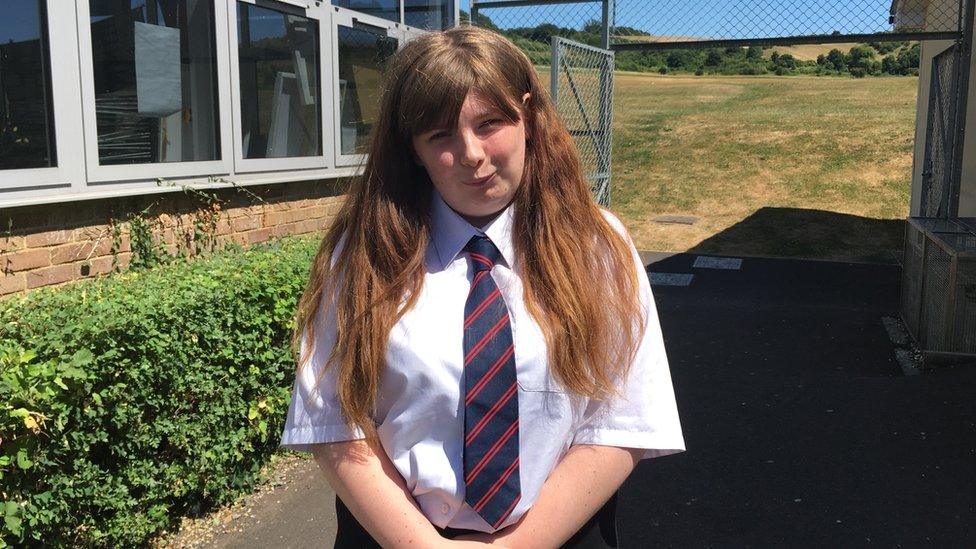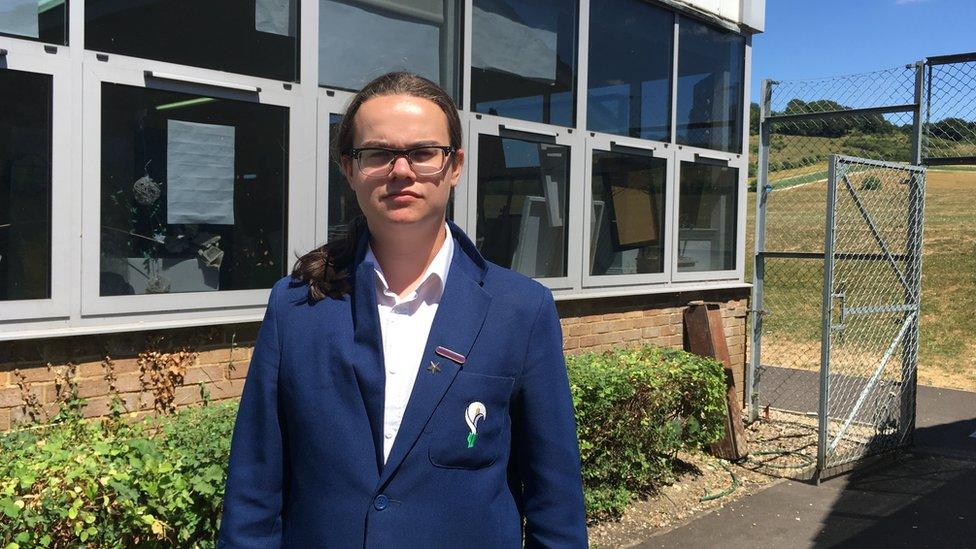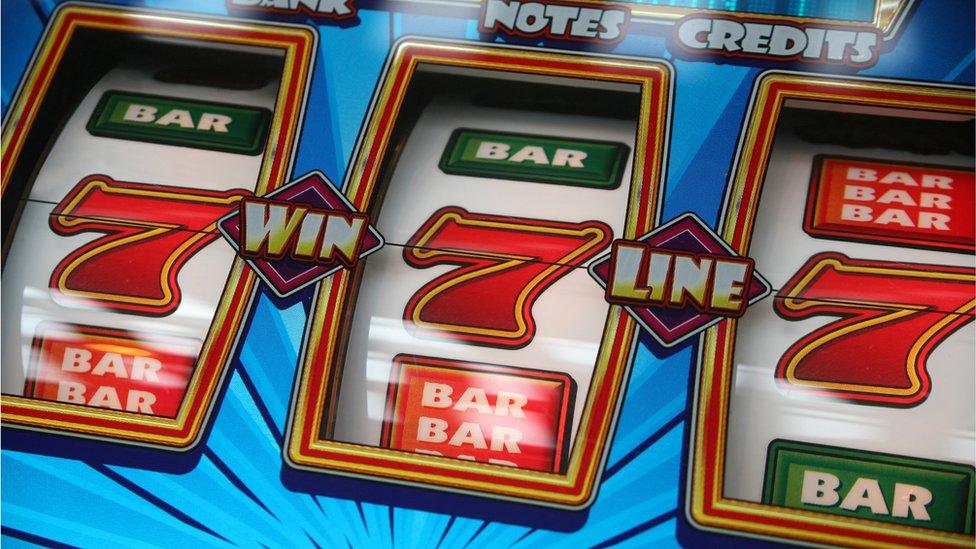Teenagers bombarded by gambling ads ask for help
- Published

Catherine says the dangers of gambling aren't highlighted
"A few years ago, I got an email from a betting website. I was only 12 or 13, so I wasn't interested.
"But for someone who got that email, being contacted personally, it could almost entice them to gamble, like it's their duty."
Catherine, now 15, was shocked to receive the email and says the risks associated with gambling should be more widely publicised, as they are with smoking, for example.
"People that smoke know it's a danger. It's on the packet. It says that it kills. It's not disguised. It's quite obvious.
"But things like gambling - where it starts off as a little bit of fun but where you could get addicted and then can't get out of the spiral - it doesn't show the dangers.
"You never see on a lottery ticket saying, 'This could lead to poverty.'"
Catherine, a Year 11 student at St Joseph's Catholic School in Salisbury, Wilts, is one of 650 teenagers to have taken part in trials of lessons designed to try to raise awareness of the risks of gambling among school-age children.
The series of four lessons, developed by the think tank Demos, encourages pupils to weigh up risks, identify manipulative behaviour by gambling companies, learn about managing impulses and help others experiencing gambling problems.
The trials come as a recent report, external by the Gambling Commission suggests up to 25,000 11- to 16-year-olds are problem gamblers, with many learning to bet via computer games and social media.

Pupils at St Joseph's say they were glad to learn more about the risks, because they think gambling is becoming more prevalent.
"Gambling is becoming more popular because we have so many online websites that we didn't have before," says Grace, 15.
"It's something that some people might be ashamed of and keep quite private, maybe because they don't want family members or partners trying to stop them."

Megan: "Gambling can have devastating effects"
Megan, 16, says: "It's becoming more popular. Gambling is more accessible these days due to apps and computers.
"Gambling can ruin people's lives because if you spend loads of money on it and don't win anything, it can have devastating effects on your home life and family life."
Catherine says: "In supermarkets, you're got those claw machines so it's even encouraging children to gamble.
"It's definitely a negative - a child could easily spend their pocket money because there's no age limit and it's so available."

An example of what one 15-year-old saw on their phone
The teenagers say prominent advertising could be fuelling a rise in young people gambling.
Bryn, 15, says he has seen an advert showing a man as glamorous as James Bond gambling successfully.
"It shows it as being a glamorous wealthy lifestyle but that's not always the truth - it gives a false idea that you'll always be a winner and be like this man."
Naoise, 14, says: "We should be cutting down on the amount of adverts. All my adverts are gambling - they should cut down on the amount of ads and put them in more age-appropriate places."
Megan says: "The thing I've noticed is that they always show the best side and never the bad."
Georgie, 16, suggests the authorities should step in and help people at risk of developing a serious gambling habit.

Bryn: "Gambling can be glamourised"
"Obviously the government needs to give people some privacy and it is a personal choice whether they choose to gamble or not - but I think the government should put in place a system that would recognise people who do gamble a lot and do have a serious problem with gambling."
And, as Catherine points out, people's perceptions of gambling do not always reflect that it can be a risky lifestyle choice.
"People often assume gambling to have negative connotations - but for some people it might be the opposite.
"It's not always going to get them into a worse situation - it can be the opposite.
"They could end up spending a couple of pounds a week and then winning millions if they win the lottery."
'Prepared for later life'
The pupils at St Joseph's say the four lessons about gambling, completed as part of their PHSE [personal, social, health and economic education] curriculum, were very useful.
"It's very useful because it talked about what techniques they [the gambling industry] use to get us to do it more," says Bryn.
Naoise says: "The best part about this programme was not only teaching us to be careful about gambling but also how it can be disguised.
"It taught us to distinguish when we might be spending more than we should be - for example, apps like games, so even if you're not spending money, you're spending the points which then teaches you to do it with money when you're older."

Naoise says gambling can be disguised
"Having been taught about the risks of gambling, it helps you understand the behaviours around gambling and why people do it," says Joe, 15.
Izak, 15, says: "It refreshed a similar idea of what we already had - it's common sense to know and limit your spending."
Georgie says: "The gambling module didn't control the pupils' opinions on the subject, it allowed the pupils to form their own ideas rather than have the teacher tell them how it is."
"It was very helpful because it prepared us for later life and the possibility of it happening in our lives or in our families' lives and help us deal with it and stop it happening," says Megan.
For assistant head teacher at St Joseph's Fran Nobis this is exactly what the school is hoping to achieve.
"It's important to arm children today with a varying amount of life skills to navigate the modern world, because we don't know the modern world they're growing up into so the more skills and awareness we give them the better.

The pupils say the lessons have helped them
"The great thing about the Demos gambling lesson trial was that it didn't patronise them - it gave the opportunity to make informed choices.
"In their generation, there will be fewer and fewer people going to a betting shop, but that doesn't mean it's not going to be a problem."
- Published19 March 2018
